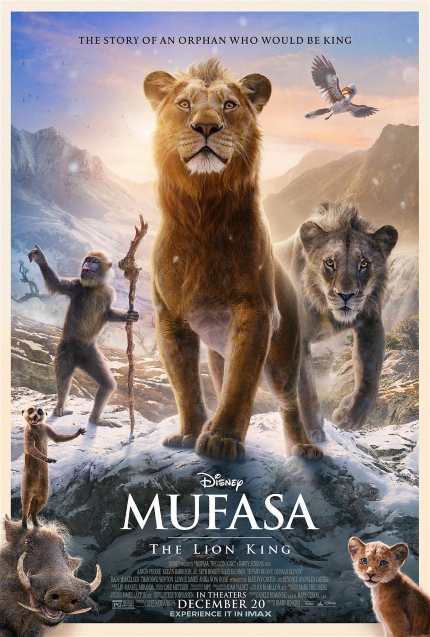MUFASA: THE LION KING Review: Barry Jenkins Brings His Indie Auteur Cred to Disney's Beloved Property

When Disney tapped filmmaker Jon Favreau (The Jungle Book, Chef, Elf) to direct a computer-animated remake of its 1994 classic, The Lion King, it was met with of raised eyebrows, minot irritation, and a shedload’s worth of doubt, but the joke – if, indeed, a joke was meant or intended – was apparently on the naysayers and scolds.
Released in the summer of 2019, the computer-animated result easily broke the $1.6B mark at the global office, proving once again that pre-packaged nostalgia, especially pre-packaged nostalgia connected to beloved, decades-old, corporate-owned intellectual property, sells incredibly well across every demographic possible.
With that kind of shareholder-pleasing return on investment, a sequel was all but inevitable. Instead, though, Disney executives decided to sidestep a full-on sequel and green-light a second entry in its hoped-for franchise, Mufasa: The Lion King. As low-risk a decision as any in corporate America, Mufasa: The Lion King promised a backstory (“lore” by another, more current definition) for the characters, specifically the title character, that audiences in 1994 grew to love and, almost as importantly, grieve when he exited The Lion King, the victim of his brother’s betrayal.
All of that, of course, remains firmly in the distant future for the Mufasa (voiced primarily by Aaron Pierre) we meet in the prequel. Introduced first as a cub to loving parents, Mufasa’s story takes a Moses-like turn.
Separated from his family by a great flood, Mufasa finds himself alone, a stranger in a strange land. Saved from a premature demise by another cub, Taka (Kelvin Harrison Jr. as a near-adult), Mufasa joins a new pride.
Reluctantly admitted into the pride by Taka’s xenophobic father, Obasi (Lennie James), but nurtured by Obasi’s lioness partner, Eshe (Thandiwe Newton), Mufasa grows into a skilled hunter, tracker, and all-around good-hearted, thoughtful, empathetic lion, a loyal companion and friend to the monarch-in-waiting, Taka. (No guesses as to Taka’s future identity or the endpoint of his relationship with Mufasa.)
Where Mufasa repeatedly exhibits all of the positive qualities of a natural leader, Taka fails at almost every turn (an implicit critique of birthright monarchies). Cowardly, lazy like his father, and prone to deceitfulness, Taka’s only saving grace lies in his bond with his adopted brother. When, however, another, far more vicious, rapacious pride led by a white lion, Kiros (Mads Mikkelsen), intrudes on the territory ruled over by Obasi, Taka and Mufasa narrowly escape Kiros’s grasp, their goal a faraway, possibly fictional land, Melele, once mentioned by Mufasa’s long-gone biological parents, as a place of light and abundance.
Melele exists, of course, though it takes the better part of two hours before Mufasa, Taka, a stray lioness from another, displaced pride, Sarabi (Tiffany Boone), her companion bird/scout Zazu (Preston Nyman), and eventually, Rafiki (Kagiso Lediga), a mystical mandrill obsessed with similar visions of fertile lands, a great tree, and harmonious intercourse between species (cue “circle of life” callout, however deserved or undeserved). Unwilling to let Musafa and Taka flee into self-imposed exile, Kiros and his supporters relentlessly hunt Mufasa and company through forests, jungles, and mountains, all the while threatening their imminent extinction.
Directing from Jeff Nathanson’s (Young Woman and the Sea, Pirates of the Caribbean: Dead Men Tell No Tales, Catch Me If You Can) formulaic script, Barry Jenkins (If Beale Street Could Talk, Moonlight, Medicine for Melancholy) employs every virtual trick in the book, from unmotivated camerawork soaring over relatively well-realized, photorealistic environments, frantic, sometimes frenetic editing, and an over-emphasis on close-ups of the various characters to evoke a magical, fantastical setting for a story that rarely feels essential or necessary to the 1994 original film, well-deserving of its classic status, or the justly dismissed 2019 remake.
Despite the title, Mufasa; The Lion King isn’t entirely a prequel. It also functions as a chronological sequel to The Lion King, albeit a limited one. Presumably to bring back otherwise familiar characters, specifically Pumbaa (Seth Rogen), an unhygienic warthog, and Timon (Billy Eichner), an anxiety-prone meerkat, as comic relief, periodically interrupting an elder Rafiki (John Kani), as he recounts Mufasa’s story to his inquisitive granddaughter, Kiara (Blue Ivy Carter), as she anxiously awaits the return of her absent parents, Simba (Donald Glover) and Nala (Beyoncé Knowles-Carter), from an unspecified errand as a dramatic thunderstorm unfolds outside their shelter.
Any hope of even the slightest bit of subversion involving the framing story (e.g., Rafiki as an unreliable narrator, Pumbaa and Timon inserting themselves into the story as it unfolds, and so forth) dissipates almost as quickly as the idea enters the minds of audience members. A nod at the destructive effects of Western colonialism in Africa through Kiros and his pride of white lions feels as heavy-handed as it sounds.
Between Nathanson’s risk-averse script and Jenkins’s anonymously competent, corporatized direction, the latter both expected and disappointing in equal measure, Mufasa: The Lion King offers few narrative or thematic surprises, desperately embracing the found family idea — and ideal — to create the hint of an emotional connection between audiences and the moving images onscreen.
Mufasa: The Lion King opens Friday, December 20, only in movie theaters, via Disney Pictures.
Mufasa: The Lion King
Director(s)
- Barry Jenkins
Writer(s)
- Linda Woolverton
- Irene Mecchi
- Jonathan Roberts
Cast
- Aaron Pierre
- Kelvin Harrison Jr.
- Seth Rogen
The Lion King
Director(s)
- Roger Allers
- Rob Minkoff
Writer(s)
- Irene Mecchi
- Jonathan Roberts
- Linda Woolverton
Cast
- Matthew Broderick
- Jeremy Irons
- James Earl Jones

Do you feel this content is inappropriate or infringes upon your rights? Click here to report it, or see our DMCA policy.






